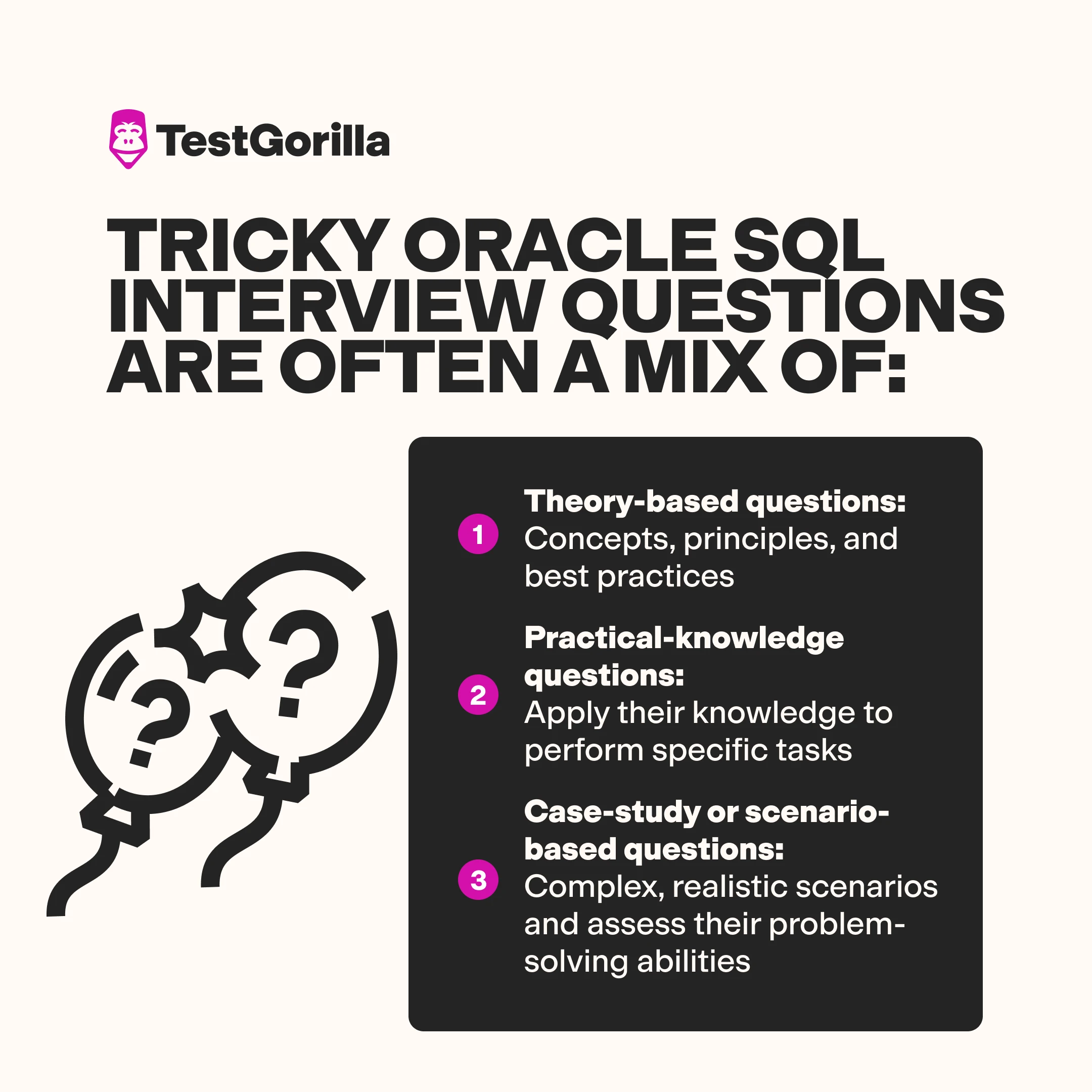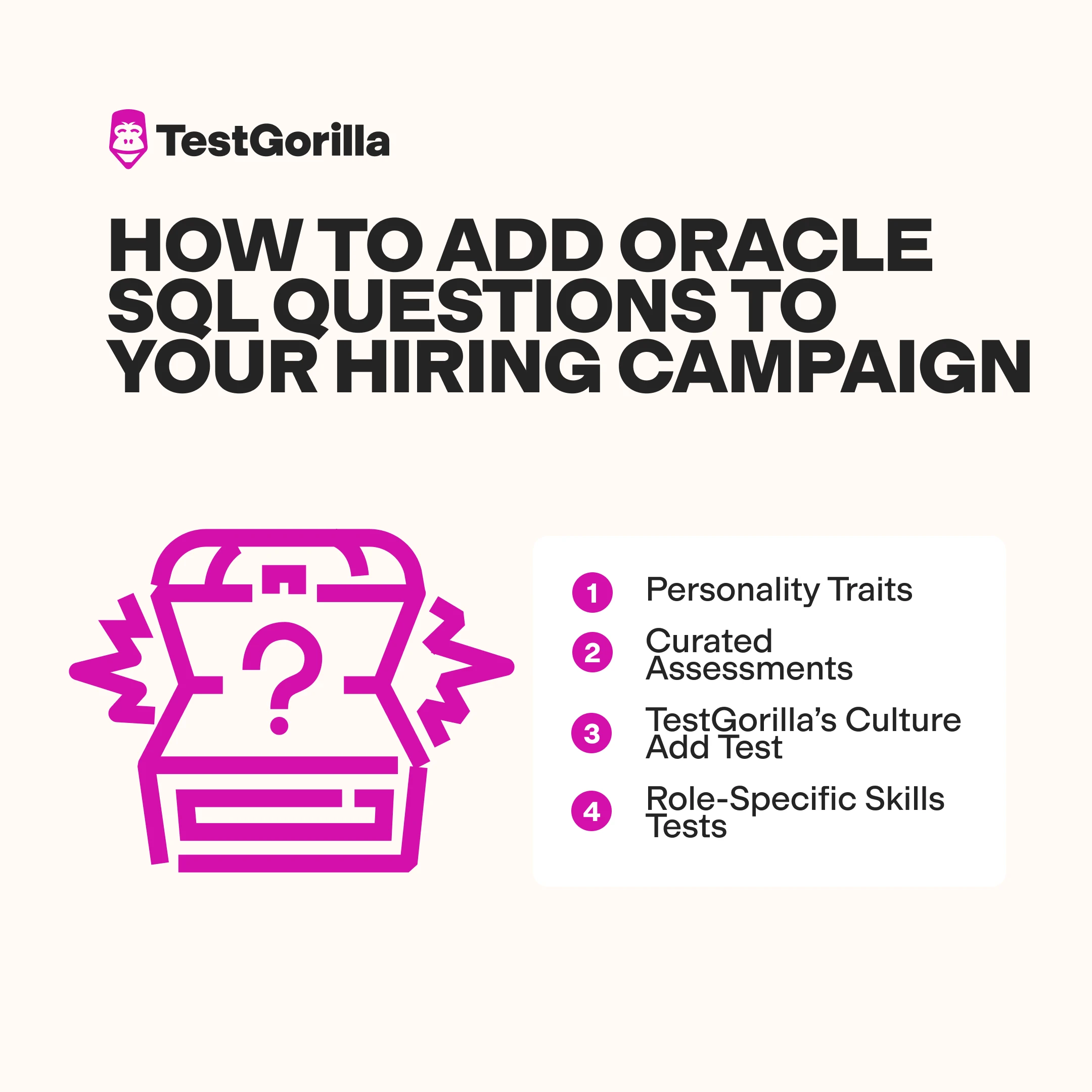30 tricky Oracle SQL interview questions and answers
Find and hire the best Oracle SQL developers using TestGorilla.
Many companies today work with Oracle databases to gain valuable, data-driven insights that enhance their performance. But, hiring the wrong Oracle SQL developer can have disastrous consequences for your business.
Inefficient or incorrect query writing can lead to poor database performance, security breaches, missed deadlines, and more – damaging productivity and your reputation with customers and users. That’s why it's critical to assess every candidate thoroughly before hiring them into this role.
In this guide, we share 30 tricky Oracle SQL interview questions you can use in your assessment process. These novel questions will test your candidates’ theory, practical knowledge, and ability to think on their feet in different situations so you can ensure you’re selecting the right person for the job.
What are tricky Oracle SQL interview questions?
Oracle SQL interviews aim to verify candidates’ skills in Oracle SQL operations such as data management, manipulation, retrieval, and more.
“Tricky” Oracle SQL interview questions are tougher than your average questions. They’re designed to assess whether candidates have the in-depth knowledge and problem-solving skills required for complex Oracle SQL roles.
You can use these questions to hire for a number of different roles – including data analyst or engineer, software developer or engineer, business analyst, database architect, database developer and database administrator.
Tricky Oracle SQL interview questions are often a mix of:
Theory-based questions. These test candidates’ theoretical understanding of concepts, principles, and best practices. They often start with “how does,” “what is,” or “explain the benefits of.”
Practical-knowledge questions. These ask candidates to apply their Oracle SQL knowledge to perform specific tasks. They’re usually phrased as, “Write an SQL query to…”
Case-study or scenario-based questions. These provide candidates with complex, realistic scenarios and assess their problem-solving abilities. They can start with phrases like “Consider a scenario where…”
Why include tricky Oracle SQL questions in your interviews?
Including tricky Oracle SQL questions in your interviews helps make your hiring process robust and airtight. We list some of their key benefits below.
Learn about candidates’ thought processes and problem-solving skills
Tricky Oracle SQL questions are challenging and help you test whether a candidate is able to think methodically, quickly, and creatively.
Moreover, assessing candidates doesn’t stop at right or wrong answers. Understanding candidates’ thought processes and how they work through complex problems is extremely beneficial.
You get this only when you can ask them questions in an interview format – either in-person or virtually. Plus, scenario-based questions are a reliable indicator of how a candidate will work through problems in the future.
Verify that candidates have what it takes to succeed in your company
A candidate’s resume lists their skills, attributes, and achievements. But, there’s no way to verify if these are accurate by relying solely on resume screening.
Tricky Oracle SQL questions let you go deeper into their skill set and ask questions more relevant to the role in your company. These questions also give you a detailed understanding of the candidate's strengths, areas for development, and more.
For instance, a candidate may be well-versed in Oracle SQL theory but struggle with its practical applications. This information can help you decide if the candidate can still succeed – for example, in a junior role rather than a senior one. In addition, you’ll learn more about how to support their development if you do hire them.
Assess candidates’ behavioral attributes and lines of questioning
One of the main advantages of in-person or virtual interviews is that you get real-time and unfiltered interaction with the candidate. You can assess their behavioral attributes to see if they’re the right fit for your culture and employees. For instance, by asking them a very complex Oracle SQL question with a time limit, you can judge how they respond to deadlines and work under high-pressure environments. This adds an extra layer of assessment and reduces the chances of mis-hiring. Additionally, in this interview setting, candidates can seek clarification on tricky questions they don’t understand. You can get meaningful insights into how skilled and knowledgeable candidates are through the questions they ask. Plus, this can help you identify and fix any ambiguity in your question set.
Eliminate bias in the hiring process
Oracle SQL interviews are an effective way to differentiate between candidates with similar backgrounds and skill sets. With insight into their thought process, behaviors, and more, you can make objective decisions about whether a candidate is suitable for a role.
This helps you make better hiring decisions and avoid unconscious biases in the hiring process.
The best insights on HR and recruitment, delivered to your inbox.
Biweekly updates. No spam. Unsubscribe any time.
30 tricky Oracle SQL interview questions and answers
Below, we’ve listed 30 complex Oracle SQL interview questions and answers you can use for a well-rounded interview approach. These questions contain a mix of theoretical, practical, and scenario-based questions.
We’ve also provided high-level answers for each question – but the more detail and insight a candidate provides, the better.
Oracle SQL theoretical questions
Theory questions will help you assess candidates’ grasp of key concepts, fundamentals, and approaches to working with Oracle databases. Below are 10 example questions you can use in your interviews.
1. Explain the difference between RANK and DENSE_RANK functions in Oracle SQL.
RANK and DENSE_RANK both assign rankings to result rows.
With RANK, when two or more rows have the same values, they’ll be assigned the same rank, and the subsequent rank will be skipped.
Meanwhile, DENSE_RANK provides a consecutive ranking and doesn’t leave gaps in ranking even when duplicate values exist.
2. What is the purpose of the UNION operator in Oracle SQL?
The UNION operator combines the results of two or more SELECT queries into a single result set – as if it came from a single query. It merges the rows from different queries, removes duplicate rows, and presents a unified result.
3. Name one advantage of using indexes in a database.
Indexes improve query performance through quicker data retrieval by reducing the need for full table scans.
4. Differentiate between the WHERE clause and the HAVING clause in Oracle SQL.
The WHERE clause filters rows before grouping – that is, before they’re included in the result set. Filtering is also based on certain conditions.
The HAVING clause, on the other hand, filters data post-grouping – meaning after aggregation.
5. How does the Oracle Query Optimizer determine an execution plan for a query?
It uses heuristics or rules of thumb and statistics to decide on the most efficient execution plan based on available indexes, table size, and query complexity.
6. What is the key difference between ROW-level and STATEMENT-level triggers in Oracle?
ROW-level triggers fire once for each affected row, therefore allowing row-specific actions.
STATEMENT-level triggers are executed only once for the entire statement. This is regardless of the number of affected rows and is more suitable for actions that don't depend on individual rows.
7. What do the COMMIT and ROLLBACK statements in Oracle SQL do?
The COMMIT statement saves all the changes made in a transaction to the database, making them permanent. The ROLLBACK statement undoes the changes in the transaction and reverts the database to its pre-transaction state.
8. What are some advantages of using bind variables in Oracle SQL?
Bind variables improve performance through caching and reusing, reducing the need for parsing. Bind variables also protect against SQL injection attacks, require minimal maintenance, and reduce memory usage.
9. Differentiate between VARCHAR and VARCHAR2 data types.
Both VARCHAR and VARCHAR2 are used to store variable-length character strings. VARCHAR is a standard SQL data type which works across different relational database systems. Whereas, VARCHAR2 is specific to Oracle.
VARCHAR 2 has several advantages. It is more storage efficient and, unlike VARCHAR, it does not store trailing spaces at the end of a string so avoids potential unexpected results when comparing strings. However, VARCHAR2 might not be supported non-Oracle database systems.
10. How would you explain database roles and privileges in Oracle SQL security? How do you grant and revoke privileges to users and roles in Oracle?
Database roles are named groups of related privileges. They allow for assigning multiple privileges to a role and granting or revoking the role to users, simplifying security management. The GRANT statement is used to grant, and the REVOKE statement is used to revoke privileges.
Oracle SQL practical application questions
These questions aim to test how candidates can apply their Oracle SQL knowledge to perform real, practical tasks. You can use these 10 example questions to assess how they write SQL queries, retrieve and manipulate data, and use Oracle SQL features.
While we provide sample answers to each question below, there are often multiple ways to write a query to achieve the desired outcome. A candidate's answers can depend on table structure, data availability, and specific user requirements.
11. Write an Oracle SQL query to find the average salary of employees within each department.
SELECT department_id, AVG(salary) AS average_salary
FROM employees
GROUP BY department_id;
12. Write an Oracle SQL query to find employees who earn more than their managers.
SELECT emp.*
FROM Employee emp
INNER JOIN Employee mgr ON emp.manager_id = mgr.employee_id
WHERE emp.salary > mgr.salary;
13. How would you update the status column of the orders table to set all orders with a total amount greater than 1,000 to High Value?
UPDATE orders
SET status = 'High Value'
WHERE total_amount > 1000;
14. Write an Oracle SQL query to get the date and time of the last 10 logins for a specific user.
SELECT login_time
FROM UserLogins
WHERE user_id = 'specific_user_id'
ORDER BY login_time DESC
FETCH FIRST 10 ROWS ONLY;
15. Retrieve the top five highest-rated products based on customer reviews from the product_reviews table.
SELECT product_id, product_name, AVG(review_rating) AS average_rating
FROM product_reviews
GROUP BY product_id, product_name
ORDER BY average_rating DESC
FETCH FIRST 5 ROWS ONLY;
16. Calculate the total revenue generated by each customer in the last three months.
SELECT customer_id, SUM(revenue) AS total_revenue
FROM sales
WHERE transaction_date >= TRUNC(SYSDATE) - INTERVAL '3' MONTH
GROUP BY customer_id;
17. Calculate the percentage of total sales each product contributes to the overall revenue.
SELECT product_id, SUM(total_amount) / (SELECT SUM(total_amount) FROM sales) * 100 AS percentage_contribution
FROM sales
GROUP BY product_id;
18. Write an Oracle SQL query to find the names of employees not assigned to any project.
SELECT employee_name
FROM employees
WHERE employee_id NOT IN (SELECT DISTINCT employee_id FROM projects);
19. Write an Oracle SQL query to find the five most common names in the Employee table.
SELECT name, COUNT(*) AS name_count
FROM Employee
GROUP BY name
ORDER BY name_count DESC
FETCH FIRST 5 ROWS ONLY;
20. Write an Oracle SQL query to ensure only users with the manager role can insert rows into the performance_reviews table.
CREATE OR REPLACE TRIGGER enforce_manager_insert
BEFORE INSERT ON performance_reviews
FOR EACH ROW
DECLARE
BEGIN
IF NOT (IS_ROLE_ENABLED('manager')) THEN
RAISE_APPLICATION_ERROR(-20001, 'Only users with the "manager" role can insert into this table.');
END IF;
END;
/
Oracle SQL scenario-based questions
Scenario-based questions present candidates with complex case studies to solve. These require candidates to analyze the scenario, design a suitable SQL solution, and implement it.
This is a great way to see candidates’ Oracle SQL knowledge, problem-solving, and critical thinking skills in action.
Below are 10 scenario-based questions you can use in your Oracle SQL interviews.
21. You have an Employees table with columns for employee names and their respective managers. How will you find the longest chain of reporting for each employee?
WITH RECURSIVE ReportingChain AS (
SELECT employee_id, manager_id, employee_name, 1 AS chain_length
FROM Employees
WHERE manager_id IS NOT NULL
UNION ALL
SELECT e.employee_id, e.manager_id, e.employee_name, rc.chain_length + 1
FROM Employees e
INNER JOIN ReportingChain rc ON e.manager_id = rc.employee_id
)
SELECT employee_id, employee_name, MAX(chain_length) AS longest_chain
FROM ReportingChain
GROUP BY employee_id, employee_name;
22. Imagine that you have a students table with the columns student_id, student_name, and birthdate. Write an Oracle SQL query to find each student's age (in years) as of today.
SELECT student_id, student_name,
EXTRACT(YEAR FROM SYSDATE) - EXTRACT(YEAR FROM birthdate) AS age
FROM students;
23. In a database containing information about books and authors, write an SQL query to identify the author with the most published books.
SELECT author_id, author_name, COUNT(book_id) AS total_books
FROM Authors
JOIN Books ON Authors.author_id = Books.author_id
GROUP BY author_id, author_name
ORDER BY total_books DESC
FETCH FIRST 1 ROWS ONLY;
24. Imagine you have an Inventory table with product_id and quantity columns. Write an Oracle SQL query to find the products that have experienced an increase in quantity compared to the previous month.
SELECT product_id
FROM (
SELECT product_id, quantity, LAG(quantity) OVER (ORDER BY month) AS prev_quantity
FROM Inventory
)
WHERE quantity > prev_quantity;
25. Case Study: Sales Analysis System. The dataset contains information about sales transactions in a company. The "sales" table includes the following columns:
transaction_id: Unique identifier for each transaction.
customer_id: Unique identifier for each customer.
product_id: Unique identifier for each product sold.
transaction_date: The date when the transaction occurred.
quantity: The quantity of the product sold in the transaction.
unit_price: The price of one unit of the product.
You’re tasked with finding the top 5 customers who made the highest total purchase amount in the last quarter (last three months) and displaying their names and total purchase amounts. Write an Oracle SQL query to retrieve this information.
WITH LastQuarterSales AS (
SELECT customer_id, SUM(quantity * unit_price) AS total_purchase_amount
FROM sales
WHERE transaction_date >= TRUNC(SYSDATE) - INTERVAL '3' MONTH
GROUP BY customer_id
)
SELECT c.customer_id, c.customer_name, lqs.total_purchase_amount
FROM LastQuarterSales lqs
JOIN customers c ON lqs.customer_id = c.customer_id
ORDER BY lqs.total_purchase_amount DESC
FETCH FIRST 5 ROWS ONLY;
26-30. Case Study: Employee Performance Evaluation System.
The dataset contains information about employees' performance evaluations in a company. The "employees" table includes the following columns:
employee_id: Unique identifier for each employee.
employee_name: The name of the employee.
department: The department to which the employee belongs (e.g., HR, Finance, Sales).
rating: The employee's performance rating on a scale of 1 to 5 (5 being the highest).
years_of_experience: The number of years of experience of the employee.
salary: The salary of the employee.
manager_id: The ID of the employee's manager.
26. Imagine you’re an HR manager and want to get an overview of the average performance rating for each department. Write an Oracle SQL query to retrieve the department and the average performance rating for each department.
SELECT department, AVG(rating) AS avg_rating
FROM employees
GROUP BY department;
27. Say you’re preparing a report for the management to identify employees who have shown consistently high performance. Write an Oracle SQL query to retrieve the names and performance ratings of employees with a rating of 5 in all their performance evaluations.
SELECT employee_name
FROM employees
WHERE rating = 5
GROUP BY employee_name
HAVING COUNT(*) = (SELECT COUNT(*) FROM employees);
28. Imagine you want to identify employees who are eligible for promotions based on their years of experience and current salary. Write an Oracle SQL query to retrieve the employee ID, name, department, and salary of employees who have more than 5 years of experience and earn more than $95,000 per year.
SELECT employee_id, employee_name, department, salary
FROM employees
WHERE years_of_experience > 5 AND salary > 95000;
29. Consider a scenario where the company plans to give a salary raise to employees with a performance rating of 4 or 5. Write an Oracle SQL query to update eligible employees' salaries by 8%.
UPDATE employees
SET salary = salary * 1.08
WHERE rating IN (4, 5);
30. You want to create a list of managers and the number of employees reporting to them. Write an Oracle SQL query to retrieve managers’ names and the count of employees reporting to each manager.
SELECT m.employee_name AS manager_name, COUNT(e.employee_id) AS num_employees
FROM employees e
JOIN employees m ON e.manager_id = m.employee_id
GROUP BY m.employee_name;
How to add Oracle SQL questions to your hiring campaign
Although an interview is a great way to assess traits and skills, it shouldn’t be the only tool you rely on when hiring Oracle SQL developers.
The most effective hiring decisions are made using a multi-measure technique that involves personality tests, cognitive ability assessments, job-specific skills tests, and more.
With TestGorilla, you can access an extensive library of pre-employment tests and create tailored assessments for your Oracle SQL hiring campaign. Consider including:
Personality tests such as the Enneagram, DISC, or the Big 5 (Ocean) to get a better understanding of their behavioral attributes
Curated assessments with custom questions that are relevant to your company
TestGorilla’s Culture add test to evaluate whether a candidate will fit into your company’s culture and working practices
Role-specific skills tests such as:
Combining these techniques will help make your hiring process airtight and increase your chances of finding and hiring a suitable candidate for your Oracle SQL role.
Roll out tests, track results, and make hiring decisions from an intuitive, unified platform.
Use TestGorilla to hire skilled Oracle SQL developers
Hiring an underskilled Oracle SQL developer can result in costly errors and lower productivity and can damage your reputation with stakeholders. That’s why it’s essential to have a thorough hiring process to assess candidates properly before hiring them.
Asking candidates tricky Oracle SQL questions in their interviews can give you a deeper understanding of their skills and abilities. Moreover, you’ll learn more about their thought process and how they solve problems – both reliable predictors of their future performance.
Oracle SQL interviews, used alongside other personality and cognitive ability tests, give you a complete picture of your candidate's skills, traits, and abilities.
To explore all these tests and more, sign up for TestGorilla’s free plan, request a free 30-minute live demo, or watch a quick product tour on our website.
You've scrolled this far
Why not try TestGorilla for free, and see what happens when you put skills first.






















